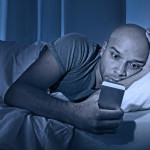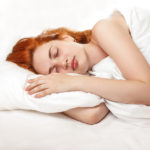By Bonnie Jenkins, Advanced Natural Wellness
“I can sleep after I’m dead!” How many times have you heard (or said) this? Well, if you suffer from insomnia or regularly deprive yourself of sleep, this old saying just might come true sooner rather than later.
Sleep deprivation has become an epidemic. According to a recent study by the Centers for Disease Control, just one in three Americans feel like they get enough sleep, and 50 to 70 million folks suffer from chronic sleep disorders like sleep apnea. It’s gotten so bad that, as a nation, we annually fill more than 53 million prescriptions for sleep aids.
But the real problem is that shortchanging yourself on shut-eye can heighten your risk of hypertension, depression and even heart attack!
No Snooze, You Lose
All of us have those nights when we just can’t sleep. And the more you try, the harder it is to nod off. But new research shows that the impact all that tossing and turning has on your overall health is profound. For one thing, a lack of sleep may contribute to weight issues. It boosts levels of the hormone ghrelin, a hunger trigger, and decreases levels of the hormone leptin, which signals fullness. As a result, you end up hungrier, crave calorie-dense foods, and don’t feel full as quickly.
Sleep deprivation also boosts levels of the stress hormone cortisol, which can drive up blood pressure and strain the heart. In fact, studies on sleep deprivation have found a higher risk of death from cardiovascular causes in people who sleep less. All the more reason to safeguard your Z’s.
Open your arteries, improve blood flow for a new health miracle...
Did you know your circulatory system has over 60,000 miles of arteries, veins and other blood vessels, if stretched end to end?
But as you age, your blood vessels undergo changes, which may cause them to stiffen, thicken and get clogged.
GOOD NEWS! Doctors have now identified a “Miracle Molecule” inside your arteries that helps OPEN your arteries and IMPROVE blood flow.
It’s what Dr. Valentin Fuster calls it, "One of the most important discoveries in the history of cardiovascular medicine."To you, that means...
- Healthy blood pressure
- Sharper mind and memory
- Skyrocketing energy and muscular strength
- Increased pleasure and passion in the bedroom
- Improved circulation to every cell and organ in your body
Go here to discover a new natural way to significantly boost the levels of this miracle molecule in YOUR body NOW!
Luckily there are some strategies you can employ to help you sleep night after night – and oddly enough, a good night’s sleep starts the minute you wake up in the morning!
I’ve always looked forward to sleeping in on the weekends. But you’ll sleep better if you get up at the same time every day – including Saturday and Sunday.
Scientists believe your biological sleep clock is controlled by two things: your circadian rhythm and a sleep homeostasis (a hunger for sleep that builds up throughout the day). Waking up each morning – and going to bed each night – at the same time reinforces this cycle, because it enables your “sleep hunger” to peak at the same time daily.
Once your day has begun, try to spend some time in the sunlight to nudge your body to stop making melatonin, the hormone that is secreted by the pineal gland in response to darkness. It’s also important to get some aerobic exercise, especially in the late afternoon. One study of 29 women and 14 men conducted at Stanford University found that those who did aerobics or took brisk 30- to 40-minute walks four times per week for 16 weeks fell asleep faster and slept more deeply and longer than the control group. Here’s why: Body temperature rises during exercise (particularly aerobic exercise) and then drops roughly five hours later, signaling drowsiness. So if your bedtime is 10 p.m., plan to work out around 5 p.m.
What you eat is also important for a good night’s sleep. Try to eat dinner about four hours before bedtime and include plenty of complex carbohydrates in the meal. Carbs enhance the transport of L-tryptophan into the brain, where it is converted to sleep-inducing serotonin. Although a glass of wine may make you fall asleep faster, you’ll sleep lighter. And if you must have a bedtime snack, limit it to less than 200 calories, no closer than one hour before bedtime. Include complex carbs and calcium, such as whole grain toast with cheese, or a bowl of cereal and milk.
Breathe Easy
Over the past decade, we’ve all become aware of a condition called sleep apnea. But, even though an estimated nine percent of women and 12 percent of men in the United States suffer from it, most of us don’t have a clue what it is or how if interferes with a good night’s sleep.
The World's Quickest Solution for Ending Prostate and Urinary Misery
This has recently been revealed to be one of the only real breakthroughs in prostate health.
The seeds of a strange fruit (sometimes called "Chinese Apples") hold powerful phytonutrients that are a revolution in prostate health.
In fact, UCLA and Veterans Administration research have now proved this to be true.
Not only that, but it may be the worlds quickest solution for ending prostate misery.
Simply stated, these phytonutrients represent a huge step beyond beta sitosterol, saw palmetto, and other phytosterols alone.
Simply click HERE if you want to have fast prostate relief...restful, uninterrupted sleep...no more constant "urges to go"...enhanced virility...and optimal prostate support for life.
So here’s the scoop: Sleep apnea is a condition that causes breathing to stop five to 30 times per hour during the night. For some, mixed signals are sent from the brain to the muscles that control breathing. But in most cases, the cause is obstructive sleep apnea, which makes the throat muscles relax and close up. You may not wake up but you’ll be robbed of deep sleep, leading to morning headaches and daytime sleepiness. The resulting lack of oxygen in the blood and stress on the heart can also lead to high blood pressure, boosting the risk of having a stroke or heart attack.
Experts believe that the nation’s soaring obesity rates mean that more people are suffering from sleep apnea. (An obese neck is more likely to collapse in on itself during slumber.) But the majority of sufferers don’t even know they have it. A sleep-lab analysis is often needed to verify the condition.
If you do have sleep apnea, sleeping on your side may help keep your throat open. Losing weight and staying away from alcohol can prevent, and possibly even reverse, the probem. If you need more help, ask your doctor about a continuous positive airway pressure (CPAP) mask. This nifty contraption gently blows air into the throat while you sleep, keeping the airway open.
Wonderful Weeds
Getting a good night’s sleep might be as easy as reaching for one of three herbal remedies. Valerian shortens the time it takes to fall asleep and improves sleep quality. Research suggests it works by binding to the same receptors in the brain as the sedative Valium. Try 300-400 mg. of valerian in either extract or capsule form one hour before bedtime.
Traditionally used to soothe anxiety, kava-kava calms the mind to reduce anxiety-driven insomnia. It’s my top pick for gently easing you into sleep with no morning grogginess. But in 2002, most health food stores stopped selling kava-kava after the FDA issued a warning that the herb may cause liver toxicity. What they didn’t say was that only people who took leaf and vine extracts instead of the safer root had problems. Fortunately, reason prevailed, and kava-kava is now back on store shelves. For insomnia, take 150 to 300 mg. of a standardized supplement 30 to 60 minutes before bedtime. And, even though kava root is safe under normal circumstances, don’t give it to children, and avoid the herb if you’re pregnant or have liver problems.
Another highly recommended herb for sound sleep is passionflower. While it may not spark passion, it is a wonderfully relaxing remedy for insomnia. In a concentrated extract, the suggested dosage for passionflower is 200 to 300 mg. one hour before bedtime. If you just need a little nudge to get to dreamland, try a cup of chamomile or lemon balm tea. Either of these herbal brews can gently relax your mind and body to help you get your 40 winks.
One Last Thing …
If you’ve tried everything you can think of, and you’re still staring at the ceiling at 3 a.m., maybe it’s the medicine you’re taking. Prescription medication can disrupt the normal balance of the body and lead to a disruption in sleep or insomnia. Here is a short list of some types of medicine that can adversely affect sleep:
- antidepressants
- antihistamines
- decongestants
- sleeping pills
- Theophylline (a respiratory drug for COPD)
- weight-loss medication
If you’re sleepless and taking one of these drugs, talk with your doctor about other options. It just might help you sleep easier – and help you nod off considerably faster.
This Just in …
Chronic inflammation – it’s the villain in a number of diseases like arthritis, cancer and heart disease. But you might be able to reign in rampant inflammation by simply swapping your morning glass of orange juice for açai (pronounced a-sigh-ee) juice.
Açai has gained a reputation as a super antioxidant, boasting 10 times the antioxidant power of grapes and twice that of blueberries. But a new study in the Journal of Agricultural and Food Chemistry found that the juice from this South American berry was able to cross cell membranes – which means it can protect cells against free radical damage from the inside out. Plus, the researchers found that this tropical fruit from Brazil has potent anti-inflammatory properties. It’s so powerful that the scientists conducting the study think açai may be able to actually reverse the progression of certain diseases, like arthritis.
Because it’s the new kid on the block, açai is being put in everything from ice cream to energy bars. But just because something contains this superfruit, don’t assume you’re getting its antioxidant and anti-inflammatory benefits. Açai is a very delicate fruit, and the health benefits can be lost if it’s overprocessed. To get the most açai has to offer, look for either açai juice that is minimally processed or freeze-dried açai supplements.
References:
Healthwise. “Medication or other drug use and sleep problems.” Website: http://health.yahoo.com/topic/sleep/resources/article/healthwise/aa2134.
Jensen GS, Wu X, Patterson KM, et al. “In Vitro and in Vivo Antioxidant and Anti-inflammatory Capacities of an Antioxidant-Rich Fruit and Berry Juice Blend. Results of a Pilot and Randomized, Double-Blinded, Placebo-Controlled, Crossover Study.” Journal of Agriculture and Food Chemistry. 2008;56:8326–8333.
Krenn L. “Passion Flower (Passiflora incarnata L.) – a reliable herbal sedative.” Wiener medizinische Wochenschrift. 2002;152:404-406.
Shinomiya K, Inoue T, Utsu Y, et al. “Effects of kava-kava extract on the sleep-wake cycle in sleep-disturbed rats.” Psychopharmacology. 2005;180:564-569.
Ziegler G, Ploch M, Miettinen-Baumann A, et al. “Efficacy and tolerability of valerian extract LI 156 compared with oxazepam in the treatment of non-organic insomnia – a randomized, double-blind, comparative clinical study.” European Journal of Medical Research. 2002;7:480-486





